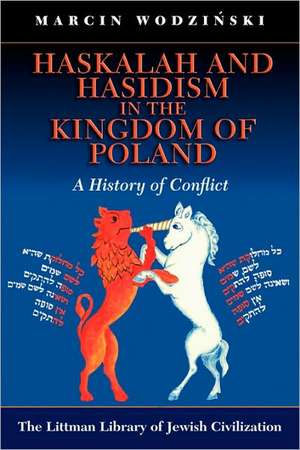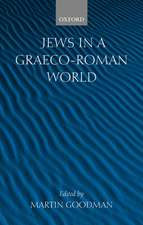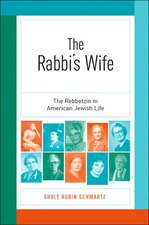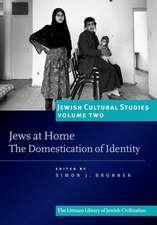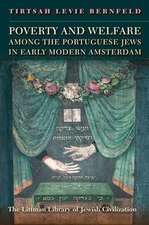Haskalah and Hasidism in the Kingdom of Poland: A History of Conflict
Autor Wodzinski, Marcin Wodzinski Traducere de Sarah Cozensen Limba Engleză Paperback – 31 iul 2009
Preț: 263.93 lei
Nou
Puncte Express: 396
Preț estimativ în valută:
50.52€ • 52.06$ • 42.65£
50.52€ • 52.06$ • 42.65£
Carte tipărită la comandă
Livrare economică 01-15 martie
Preluare comenzi: 021 569.72.76
Specificații
ISBN-13: 9781906764029
ISBN-10: 1906764026
Pagini: 335
Dimensiuni: 156 x 234 x 19 mm
Greutate: 0.49 kg
Ediția:Revised
Editura: Littman Library of Jewish Civilization
ISBN-10: 1906764026
Pagini: 335
Dimensiuni: 156 x 234 x 19 mm
Greutate: 0.49 kg
Ediția:Revised
Editura: Littman Library of Jewish Civilization
Cuprins
Note on Transliteration and Place Names List of Figures List of Abbreviations Introduction 1 The Beginnings: Anti-Hasidic Criticism in the Last Years of the Polish-Lithuanian Commonwealth The Mitnagedim * The First Voices of the Haskalah * From Lithuania to Berlin: Salomon Maimon * From Podolia to Galicia: Mendel Lefin * The Commonwealth's First Maskil: Jacques Calmanson * Conclusions 2 Characteristics of the Haskalah in the Kingdom of Poland, 1815-1860 What was the Kingdom of Poland? * Who were the Maskilim of the Congress Kingdom? * Institutions of the Haskalah: The Maskilim as a Social Group * The Geography of the Polish Haskalah * Ideology and Programme * Does Language Make a Maskil? * Why in Polish? The Polish Haskalah and its Polish Context * Conclusions 3 The Development of Anti-Hasidic Criticism among the Maskilim of the Congress Kingdom, 1815-1830 The Demonization of Hasidism: Friedlander, Radominski, Niemcewicz * The Polish Haskalah in the Debate of 1818-1822: Antoni Eisenbaum * The Kalisz Voivodeship: Preliminary Inquiries and Reports * The Government Inquiries of 1818-1824 and Abraham Stern's Role * Why did the Polish Maskilim Ignore Hasidism? * Conclusions 4 Growing Interest, Growing Conflict, 1831-1860 Growing Interest in Hasidism * The Theatre of the Hasidim of Efraim Fischelsohn * Reform Projects: Eliasz Moszkowski * A New Stage of Hasidic Expansion * Conflict in Daily Life: Anatomy of Dissent * The First Maskilic Defence of Hasidism: Jakub Tugendhold * Conclusions 5 The Twilight of the Haskalah and the Dawning of Integration Maskilim, Integrationists, and Assimilationists * From the Polish Language to a Polish Identity * Polish Patriotism * Nationality or Religion? * Face to Face with Hasidism * Conclusions 6 Hatred or Solidarity? Jewish and Polish-Jewish Fraternity in the 1860s Diagnosis * Solutions * Characteristics of Hasidism * Daniel Neufeld: In Praise of Hasidism * The Anatomy of Conflict: The Sequel * Conclusions 7 Waning Enthusiasm: Izraelita and the Moderate Integration Movement Jutrzenka's Heritage * Peltyn's Credo * The Way to Recognition * Izrael Leon Grosglik: 'Letters from a Young Ex-Hasid' * The Great Disillusionment * Hilary Nussbaum: A Historian's Helplessness * New Threats * Conclusions 8 The Death of an Idea: Political, Historical, and Poetic Visions of Hasidism An Ideological Crisis in the Integration Camp * The Political Aspect of Hasidism: Nachum Sokolow * Beyond the Masklic Historiography of Hasidism * 'Singing and Dancing': The Hasidic Trend in Literature * Conclusions Conclusion: Between Marginalization, Demonization, and Nostalgia Appendices 1 Calmanson on Hasidism (1797) 2 Stern's Report (1818) 3 Radominski on Hasidism (1820) 4 The Lask Kahal's Complaint about the Hasidic Shtibl (1820) 5 Schonfeld's Report on the Shtibl in Lask (1820) 6 Schonfeld's Report on the Baths in Czestochowa (1820) 7 Advisory Chamber of the Jewish Committee on the Hasidic Rabbi in Plock (1829) 8The Hasidim in Pilica (1830) 9 The Maskilic Prayer House in Suwalki (1833) 10 Tugendhold's Report on Smoking Tobacco in the Beit Midrash (1840) 11 Moszkowski's Memorandum (1845) 12 Rosen's Opinion of Moszkowski's Memorandum (1845) 13 Protocol of the Inquiry into Hasidic Persecutions in Lodz (1848) 14 Report on Tsadik Abraham Twersky of Turisk (1857) 15 Tugendhold on Abraham Twersky of Turisk (1857) 16 Aeolus and Phoebus (A Fable) (1863) 17 Tsadik Brukman and the Doctors in Piotrkow (1870) 18 Segel on Hasidism (1897) 19 Sokolow on Hasidism (1898) Bibliography Index of Persons Subject Index
